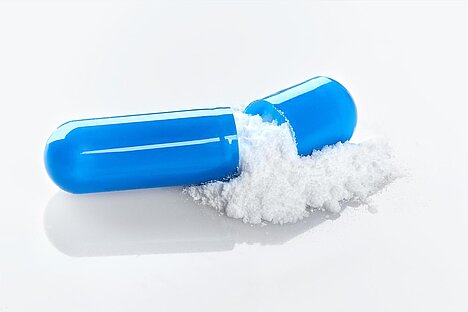Sodium sulfite

Sodium sulphite is a white, crystalline powder used as a preservative and antioxidant for food. It is also found in some products intended for dogs, such as dumpling aid or certain dry foods. But what exactly is sodium sulphite and how does it affect your dog's health? In this article, you can find out more about this additive and its advantages and disadvantages.
What is sodium sulphite?
Sodium sulphite is the sodium salt of sulphurous acid. It is formed, for example, when sulphur dioxide is introduced into caustic soda or by neutralizing caustic soda with sulphurous acid. It can also be obtained from sodium hydrogen sulphite or sodium carbonate.
Sodium sulphite has the molecular formula Na2O3S and a molar mass of 126 g/mol. It has a trigonal crystal structure and is hygroscopic, i.e. it attracts moisture from the air. It is easily soluble in water and has an alkaline reaction. It has a reducing effect, i.e. it absorbs oxygen and releases electrons. It also has a germicidal effect.
Why is sodium sulphite used for dogs?
Sodium sulphite has several applications in the food industry. It is used as a preservative to prevent the growth of microorganisms. It is also used as an antioxidant to slow down the oxidation of fats and vitamins. This improves the shelf life and quality of food. It also prevents the browning of potato dough or other starchy foods.
Sodium sulphite is also used for dogs to achieve the same effects. For example, it is contained in dumpling aid, which is often used as a filler for dog food. It is also contained in some dry foods that have a high proportion of plant-based ingredients. Sodium sulphite is said to keep the food fresh and maintain its color.
What are the advantages and disadvantages of sodium sulphite for dogs?
Sodium sulphite has some advantages for dogs, but also some disadvantages. The advantages are:
- It extends the shelf life of the food and protects it from spoiling.
- It preserves the color of the food and makes it more visually appealing.
- It protects the vitamins in the food from degradation by oxygen.
The disadvantages are:
- It can trigger allergic reactions or intolerances, such as skin rashes, itching, diarrhea or vomiting.
- It can impair the absorption of trace elements such as copper or zinc, which are important for a dog's health.
- At high doses, it can have a toxic effect and lead to symptoms of poisoning such as breathing difficulties, convulsions or unconsciousness.
How much sodium sulphite is allowed for dogs?
The European Union has set a maximum amount for sodium sulphite in food that must not be exceeded. This is 500 mg/kg for meat products and 1000 mg/kg for other foods. There are no specific limits for dog food, but it is recommended to adhere to these guidelines.
The acceptable daily intake (ADI) for sodium sulfite is 0.7 mg/kg body weight per day. This means that a 10 kg dog should not consume more than 7 mg sodium sulfite per day.
Sodium sulphite is an additive that is safe for dogs in small quantities, but can be harmful in high doses. It has some advantages for the shelf life and quality of the food, but also some disadvantages for the dog's health. It can trigger allergic reactions or intolerances, impair the absorption of trace elements or lead to symptoms of poisoning.
If you want to avoid sodium sulphite in your dog food, you should pay attention to the ingredients list and look for alternatives. There are many natural preservatives and antioxidants that are suitable for dogs, such as vitamin C, vitamin E or rosemary extract.
If you notice any signs of hypersensitivity or poisoning in your dog, you should see your vet immediately. We are not a substitute for a vet, but we try to be as accurate as possible. Every dog reacts differently and we recommend you get a second opinion or consult your vet if in doubt.
Stay healthy and take good care of your four-legged friend!😊
Similar to Sodium sulfite
Sodium bisulfite is a chemical compound used as a preservative and antioxidant in various foods and beverages, as well as in photography and various industrial processes. It works by scavenging...
Sodium disulphite is mainly used as a preservative and antioxidant. It prevents the growth of microorganisms and the loss of color and flavor through oxidation. It is used in dried fruit,...
Potassium sulphite (K2SO3) is a salt of sulphurous acid and is often used as a preservative in the food industry. Its main task is to prevent oxidation and thus extend the shelf life of food. In the...
Potassium disulphite is also known as potassium metabisulphite, potassium pyrosulphite or E 224. It is a sulphite, which consists of sulphur and oxygen. Potassium disulphite is a white solid with a...



